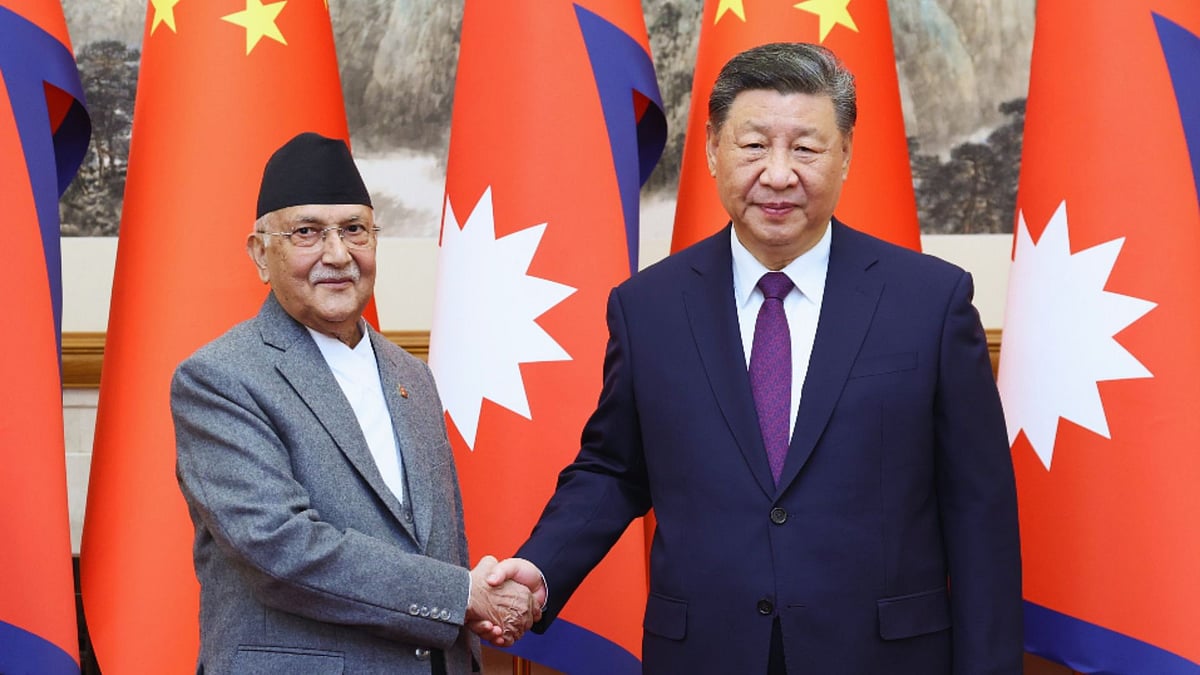Oli in China: Nepal and the Challenges of Growing Dependence on Beijing
In recent years, Kathmandu has also expressed strong support for the One China Policy.

advertisement
In a first, Nepalese Prime Minister KP Sharma Oli, who began his fourth term in July 2024, chose China as his first destination for an official visit instead of India. Oli, accompanied by a delegation of 87 members, began his four-day visit to China on 2 December, at the invitation of Chinese Premier Li Qiang. During the trip, he met with President Xi Jinping, Premier Li Qiang, and members of the Chinese business community.
During the visit, Xi emphasised, “China places Nepal in an important position in its neighbourhood diplomacy and is willing to work with Nepal to consolidate traditional friendship and push for new progress in advancing the China-Nepal strategic partnership of cooperation featuring ever-lasting friendship for development and prosperity.”
The Nepalese Prime Minister responded, stating, “Under the dynamic leadership of President Xi Jinping, China has achieved remarkable development, which stands as a miracle in human progress. As a friend of China, Nepal is deeply proud of and inspired by these achievements and hopes to learn from China's successful experience to drive its own development and prosperity. There are no problems, only friendship, between Nepal and China. The relationship between the two countries is based on friendship, equality, and respect.”
An article in the Global Times quoted Qian Feng, director of the research department at the National Strategy Institute at Tsinghua University: “The development of bilateral relations between China and Nepal is in the fundamental interests of the two nations and their people and leaves no room for a third party to sow discord about it. China respects Nepal's right to independent development and hopes India, which has a significant influence on Nepal, refrains from meddling and interfering in Nepal as in the past.”
These statements from Beijing underscore the importance with which it views these bilateral relations and reinforce the message that India should not perceive South Asia as its exclusive sphere of influence.
The year 2025 marks the 70th anniversary of diplomatic relations between Beijing and Kathmandu. During his visit, PM Oli extended an invitation to Xi to visit Nepal in 2025.
During the trip, Nepal signed nine agreements with Beijing, covering areas such as technical assistance, completing the Tokha-Chhahare tunnel, enhancing trade, providing Chinese language teachers, and establishing a memorandum of understanding (MoU) between the China Media Group (CMG) and Nepal Television. However, the most significant development was the signing of the Belt and Road Initiative (BRI) Cooperation Framework agreement.
Without specifying a deadline or providing substantial details, the joint statement highlighted, “The two sides expressed their readiness to sign the MoU on building the Trans-Himalayan Multi-Dimensional Connectivity Network (THMDCN) and the framework for Belt and Road Cooperation between the two governments as soon as possible.” Additionally, Chinese officials announced that the Nepalese Cabinet had agreed to accept Chinese-proposed projects worth $4.1 million.
By signing these agreements, Oli has gone against the stance of the opposition Nepalese Congress. Given the BRI’s history of evolving into a significant debt trap for smaller nations and undermining their sovereignty, this move could pose serious challenges. Nepal has already been struggling with the pressures of Chinese investments and their repayments, exemplified by the Pokhara International Airport, primarily financed by Beijing. The airport has been a financial burden on Nepal's small economy and has failed to generate substantial revenue. India's concerns regarding the airport’s potential military and strategic use by Beijing have also complicated its operations.
Nepal, a landlocked country, aspires to better access to ports and connectivity, which are critical for trade and economic growth. Xi’s promise to transform Nepal into a “land-linked nation” is understandably attractive. However, geographical realities cannot be ignored.
India remains the most logical route to fulfilling Nepal’s aspirations. The historical, geographical, and cultural ties between Nepal and India are unmatched. While Kathmandu should leverage its position in evolving geopolitical dynamics, ignoring caution and lessons from history could result in grave consequences.
(Dr Gunjan Singh is an Associate Professor at Jindal Law School, OP Jindal Global University. Her research interests are in the fields of Chinese Foreign Policy, China-South Asia Relations, Domestic Politics in China, Chinese Media, Mainland-Taiwan Relations and Space Security. This is an opinion piece and the views expressed are the author’s own. The Quint neither endorses nor is responsible for them.)